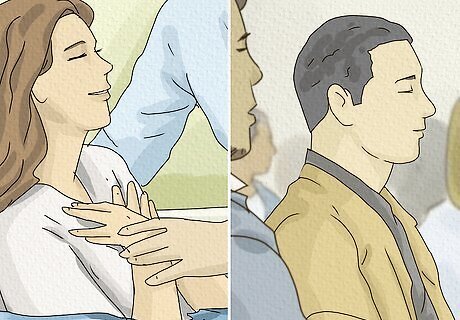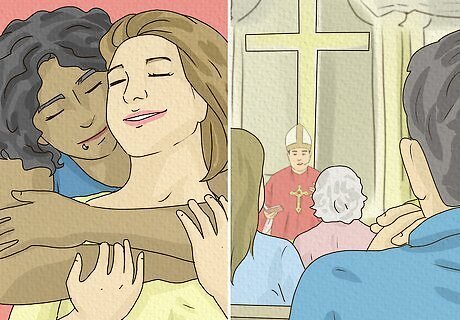
views
- Be honest about your need to repent. Be humble before God, admitting that you have made a mistake.
- Ask God and anyone else who may have been affected by your actions for forgiveness, and then work to make sure you don’t make the same mistake again.
- Try to live a good, godly life! Read your religion’s holy texts and spend time in prayer and meditation to know how to live a life that pleases God.
Accepting Your Sin

Be humble. Before you can repent, you need to admit you're not perfect! (It's kind of a relief to accept it, isn't it?) You can only receive God's love and mercy if you acknowledge you aren't 100% flawless. While nobody wants to be imperfect, accepting the fact that everyone makes mistakes, including you, can be really freeing. This is the first step to receiving God's compassion and moving on with your life. Remember, there's a difference between being humble and being self-deprecating or dwelling on your sins. As C.S. Lewis once said, "Humility isn't thinking less of yourself, it's thinking of your self less." In other words, God calls us to take responsibility for our mistakes, but He also doesn't want us to ruminate on them. So be honest about what you've done, but move on from it once you've repented. God's grace means you get to be free from mistakes you've made after you've taken accountability for them!

Trust God in your heart. You have to believe that God can forgive you and help you to lead a better life. If you don't, it's easy to lose motivation to correct your mistakes. Changing bad habits can be hard! (Trust us, we know!) But with God's support, you will succeed. Don't worry if you sometimes fail to trust in God. Even the holiest people you can imagine don't have faith 100% of the time! But by praying, studying scripture, and living according to God's word, even when you don't feel like He's there, you'll find it easier to keep your faith buoyed. In fact, Hebrews 11:1 says, "Faith is the assurance of things hoped for, the conviction of things not seen." In other words, by acting out your beliefs in God, by praying for repentance even if you're not sure He's really there, you are demonstrating your faith.

Acknowledge your mistake. What are you asking God's forgiveness for? Sometimes journaling about your sins can help you to identify them and their consequences and to help you work through any shame or guilt you might be feeling. Acknowledging the specific mistake you made and its potential consequences will help you know how to make amends for it.

Reflect on why your action was wrong. Before you repent, it's important to think about why what you did was wrong. God doesn't want blind devotion to Him; He wants a relationship with you. That means asking for repentance isn't just you apologizing for your sin and moving on, but having a real conversation with Him in which you acknowledge the effects of your sin and, potentially, what you might need to do to make amends for it. If you made a small mistake that hurt yourself, you may only need to talk to God about it, but if your mistake also hurt someone else, you may reach out to them to ask if you can apologize for what you did. Thinking about a mistake you've made can be really hard. Lots of times, it's tempting to just pretend it never happened and try to move on. But repenting is good for your soul and will make your life more enjoyable and peaceful.

Read the holy scripture to understand the significance of repentance. Before you repent, review the holy text of your sect (the Bible, the Qur'an, the Torah, etc.). Read the passages that deal with repenting to understand why it is important and what God expects from you. Spending time with scripture will help God's word enter into your heart and give you guidance. The Christian Bible has many passages that deal with repenting, including Matthew 4:17, and Acts 2:38 and 3:19. The major passage in the Quran that deals with repentance is At-Tahriim 66:8. Jews can find passages on repentance in Hosea 14:2-5, Proverbs 28:13, and Leviticus 5:5.

Ask God for forgiveness. Pray to God to ask for His forgiveness for your sins. There’s no right way to ask God for forgiveness, as long as you’re open and honest about what you’ve done and are truly remorseful. God knows your heart, even if you don't have the words to express your remorse. If you’re at a loss for what to say, try, “Dear God, I acknowledge I have sinned. It breaks my heart to know I have made a mistake, but You make all things perfect through Your endless love and mercy. I ask for Your forgiveness, God.”
Making Things Right

Consult with your spiritual adviser. Your spiritual adviser, such as a pastor, priest, imam, or rabbi will be able to help you to confess and make things right with God. Remember, their job is to help you on your journey with God! They are happy to help and they understand that man is not perfect: they will not judge you! Even if you are not officially in their congregation, you can ask for advice and set up time to meet with them, so don't feel bad talking to an adviser that you don't know. Don't feel like you have to go to a house of God to repent, however, or that you need to talk to an adviser for God to hear you. God hears just as much from you as a religious leader. You can repent completely on your own if you want to.

Correct your behavior. Repenting doesn’t just mean asking for forgiveness, but working to alter your behavior so that you don’t commit the same sin (or try not to). This is hard, we know, but you can do it! It will usually take time and a few mistakes, but if you really mean it and you really wish to repent, you will be able to overcome. Depending on what you're struggling with, it might help to tell a friend or group of friends about it and see if they're willing to be accountability buddies. You can also offer to be an accountability buddy for them as well!

Get help outside your church as needed. Changing on your own can be really hard. It's okay if you need more than just a love of God in your heart! Admitting you need help will please God, as it shows that you are humble. Consulting with a spiritual adviser and joining a congregation can be invaluable to your spiritual wellness, but don’t discount the help that doctors, support groups, and other people and professionals outside the church can offer. Getting help from people outside your church or religion does not displease God: He has helped them to gain the gifts they have for a reason!

Resolve the problems you caused. Another important part of repenting is making right the things you did. It might be tempting to only ask God for forgiveness, but if your actions had an effect on other people, talk to them about it, too. Let them know you're sorry for what you did, and ask how you can make things right. You might say something like, "Hi Don, I've been thinking about what I did and I just feel awful. I'm so sorry. I was wondering if you'd like to talk about it? If there's anything I can do to fix things between us, I'd really like to try." If you're afraid to go to them in person, try texting, e-mailing, or writing a letter. Writing out your feelings is a great, low-pressure way to talk about your mistake and apologize. It might not be obvious what someone needs to move on from a mistake you made that hurt them, so it's important to ask the people you've hurt how you can make amends instead of assuming.

Use the lessons you’ve learned to grow. Take lessons from the sins you are trying to correct to help avoid making similar mistakes in the future. Remember how crummy it felt to lie to someone, or how badly you felt when someone was hurt by your actions. Move on from your mistake, but don't forget those feelings: they'll help you be better in the future.

Guide others in how to avoid your mistakes. Another way to make your sins serve a greater purpose is to help others learn from your mistakes. Sometimes this means going and talking to people about what you did, but you can also actively help solve the problems that led you to sin. For example, if you sinned by doing drugs, consider volunteering with a local drug clinic or supporting legislation that helps combat this problem in your community.
Embracing Forgiveness

Live a life that pleases God. After you have repented, work as hard as you can to live a life that pleases God. Different religions and denominations have different things to say about what pleases God, but read your religion’s holy text and meditate or pray to figure out how you feel as well. If God is in your heart, he will lead you to the right answer. If you feel as though you need official guidance in this area, consult with members of your religious community, including your spiritual advisor. Every follower of God is working to find their own way and doing their best to live righteously, but we can all help each other find a holy path.

Enter into your religious community formally. One thing that you can do that will bring you closer to God is to formally enter and be active in your religious community. For example, if you’re Christian, get baptized if you have not been already. Go to services regularly and talk with the other members in your community about God's path. Become active in your religious community, but also take an active role in your community at large! Talk to your next-door neighbors and volunteer in your local community garden or food bank.

Be active in protecting your soul. Take an active role in protecting your soul in the future. Watch out for things that you know lead you into temptation. Keep reading the holy text and let God's light lead you down the best path for you. Confess regularly and make amends for any mistakes you make in the future; you will continue to make mistakes, and that's OK! It can help to surround yourself with holy, faithful people. Their guidance can help you stay on track throughout your life's journey.

Accept that you will make future mistakes. You are not perfect and you will make mistakes. God knows this. Acknowledging this fact is what it means to be humble! So don't lose sleep at night worrying about what you might do to displease God. What matters to Him is that you try to make things right when you mess up. It might feel tempting to avoid admitting mistakes in the future, especially if acknowledging your past sins has been painful. But trust us: God wants you to own up to your errors, and He knows that we all stumble from time to time.

Live a good life. Sins are mistakes that lead us to hurt others and hurt ourselves. When we live a life free of sin, we make our lives happier and more fulfilling. This is why it's important to take sin head-on. If you're doing something that makes you unhappy or leads to hurting other people, stop! By bringing your soul the comfort of forgiveness, you'll lead a much happier life. Then, when you find happiness in holiness, share it! Your light is a valuable gift, and when you share it with other people, you're not only improving their lives, but you're honoring God as well.




















Comments
0 comment